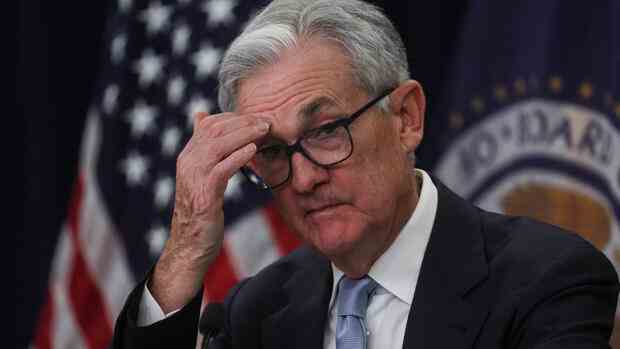The Fed chair remains on a difficult mission.
(Photo: Reuters)
Jerome Powell once compared his role to a captain steering his ship through the fog. Although the head of the US Federal Reserve (Fed) used the analogy back in 2018, it still applies today. One could even say: The fog has just thickened again.
The new big question is now: How much will the consequences of the banking crisis in the US slow down the economy? One thing is clear: Small financial institutions have already significantly restricted lending in recent months and will now be even more careful about which households and companies they lend money to. However, it is unclear how much this will slow down the economy.
Powell also admitted this at the press conference on Wednesday. The Fed head believes that the restriction on lending and the associated deterioration in credit conditions will have a similar effect to an interest rate hike. But what size are we talking about? Torsten Slok, chief economist at private equity firm Apollo, believes that the bank failures of the past few weeks alone are comparable to the effects of an interest rate hike of 1.5 percentage points.
But nobody can say for sure at the moment. Captain Powell raised interest rates again on Wednesday by 0.25 percentage points, to a range of 4.75 to 5 percent. Because in addition to financial stability, he must also ensure that inflation continues to weaken.
Doubts are growing that Powell will be able to steer his ship safely through the even denser fog. The Fed chairman has not yet recovered from the first major crisis of confidence. The Fed reacted too late and too hesitantly to rising inflation, as critics were fond of emphasizing.
Now, in even tougher conditions, Powell is tasked with finding the right course to cool the economy but not send it into recession. This “fairy tale” of a so-called soft landing will probably no longer come true, wrote Matthew Luzzetti, chief economist at Deutsche Bank, in an analysis on Wednesday. He assumes that for the Fed “a recession is becoming the most likely scenario.”
Powell’s mission was further complicated by unfortunate testimony from Treasury Secretary Janet Yellen on Wednesday. Powell stressed that bank customers “should have confidence that their deposits are safe.”
At about the same time, Yellen testified at a hearing that the government currently has no plans to guarantee all bank deposits. It’s probably an unfortunate wording, but it didn’t sit well with investors. The markets turned negative and the shares of smaller institutes in particular are continuing their downward trend of the past few days.
During the 2008 financial crisis, bank deposits were fully guaranteed for a period of time. That won’t solve Powell’s problems. But it could avoid additional interference.
More: Fed hikes rates and prepares financial institutions for change.
